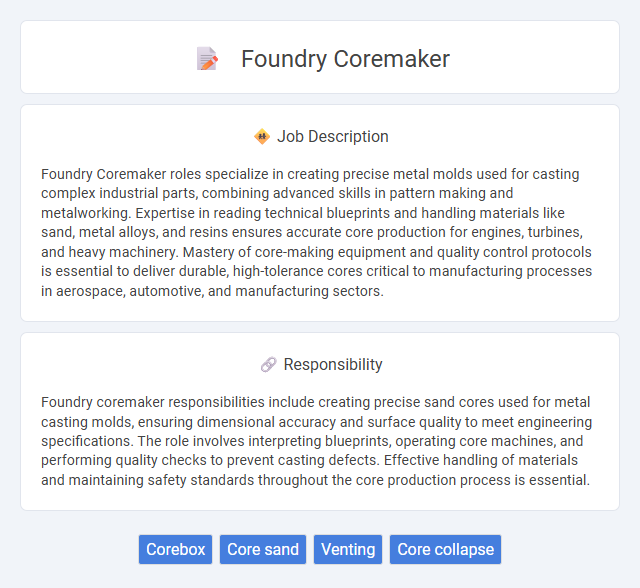
Foundry Coremaker roles specialize in creating precise metal molds used for casting complex industrial parts, combining advanced skills in pattern making and metalworking. Expertise in reading technical blueprints and handling materials like sand, metal alloys, and resins ensures accurate core production for engines, turbines, and heavy machinery. Mastery of core-making equipment and quality control protocols is essential to deliver durable, high-tolerance cores critical to manufacturing processes in aerospace, automotive, and manufacturing sectors.
Individuals with strong attention to detail and physical stamina are likely to find the Foundry Coremaker role suitable, as the job often involves handling heavy materials and working in high-temperature environments. Those who can thrive under pressure and possess good hand-eye coordination may have a higher probability of success in this position. Conversely, people with respiratory issues or difficulty standing for long periods might encounter challenges adapting to the demanding working conditions typical in foundries.
Qualification
A Foundry Coremaker requires proficiency in interpreting blueprints and molds to produce precise sand cores used in metal casting processes. Essential qualifications include hands-on experience with core-making equipment, knowledge of core baking and curing techniques, and a strong understanding of foundry safety protocols. Physical stamina and attention to detail are critical for ensuring core integrity and overall casting quality.
Responsibility
Foundry coremaker responsibilities include creating precise sand cores used for metal casting molds, ensuring dimensional accuracy and surface quality to meet engineering specifications. The role involves interpreting blueprints, operating core machines, and performing quality checks to prevent casting defects. Effective handling of materials and maintaining safety standards throughout the core production process is essential.
Benefit
Foundry coremaker jobs likely offer competitive wages and opportunities for skill development in metal casting processes. Workers may benefit from hands-on experience with core-making techniques, enhancing their technical expertise valuable in manufacturing industries. The role could also provide stable employment prospects in foundry operations with potential for career advancement.
Challenge
Working as a Foundry coremaker likely presents the challenge of precisely shaping sand cores to meet exacting specifications under time constraints. The position probably requires navigating complex patterns and materials to ensure the final product's integrity and performance. Balancing speed with accuracy is expected to be a constant challenge in maintaining production quality.
Career Advancement
Foundry coremaker jobs offer a clear pathway for career advancement through skill development in mold design, metallurgy, and precision casting techniques. Mastery in coremaking can lead to supervisory roles, quality control positions, or specialized technical careers within manufacturing and metal casting industries. Continuous training and apprenticeship programs enhance expertise, paving the way for leadership opportunities and higher earning potential.
Key Terms
Corebox
Corebox technology is central to Foundry coremaking, enabling precise sand core production for complex engine and machinery components. This system uses automated molding and sand-hardening processes to improve core accuracy, reduce defects, and enhance casting quality. Foundry experts rely on Corebox to accelerate production cycles while maintaining tight tolerances and optimal material properties.
Core sand
Coremaker jobs in foundries specialize in producing core sand molds essential for casting processes. Core sand, composed of silica sand, clay, and binders, is precisely shaped to form internal cavities in metal castings, ensuring accurate dimensions and surface quality. Expertise in mixing, molding, and curing core sand enhances casting strength and minimizes defects.
Venting
Foundry coremakers specialize in creating sand cores essential for hollow sections in metal castings, where effective venting is crucial to prevent gas entrapment and defects. Proper venting techniques manage the escape of gases formed during the casting process, ensuring the final product's structural integrity and surface quality. Mastery of venting principles directly impacts casting precision, reducing blowholes, porosity, and other common casting flaws.
Core collapse
Core collapse in foundry coremaker jobs refers to the structural failure of sand cores during the casting process, leading to defects in the final metal product. Proper coremaking techniques, including precise sand composition, binder selection, and curing methods, are critical to prevent collapse and ensure dimensional accuracy. Monitoring core integrity through inspection and adjustments minimizes casting defects, enhancing overall manufacturing quality and efficiency.
 kuljobs.com
kuljobs.com